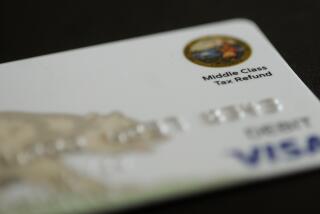Column: What if the IRS thinks you owe taxes for money you never earned?

Tax season is here, which means headaches large and small for most people. For retired pediatric dentist David Powell, however, the ticking clock of the April 15 filing deadline entered migraine territory.
He recently received a 1099 form from insurance giant MetLife for $1,500 worth of dental work he says he never performed. Since MetLife also sent that 1099 to the Internal Revenue Service, this meant Powell was on the hook for taxes on money he never earned.
He told me he tried to fix things on his own but was given the runaround by MetLife, which said nothing could be done and he was on his own.
“It’s frustrating,” Powell, 76, said. “You don’t know what to do.”
We’ll see about that.
The situation serves as a cautionary tale for anyone with incorrect tax documents — a bureaucratic obstacle course that can turn the hassle of filing a return into a needlessly difficult struggle to clear your record.
“It’s a big problem for a lot of people,” said Paul Miller, a New York certified public accountant. “I can’t tell you how many clients come into my office with 1099s that were issued erroneously.”
A 1099 is a record of money being paid. Taxpayers include 1099s with their returns to show income from sources other than an employer.
These records need to match up with the IRS records. Otherwise there can be trouble, such as your returns being audited.
All too often, Miller told me, a company that issued a bad 1099 won’t step up to make things right.
“They will not issue a corrected 1099,” he said. “It’s too monumental a task for most big companies, which may have to deal with thousands of 1099s.”
This is messed up for a number of reasons, not least being caught between a huge corporation and a huge government agency through no fault of your own.
Worse, the IRS says your best bet in such circumstances may be to pony up some cash so you have breathing room to try to fix things later.
“You may have to pay taxes on money you never received,” acknowledged Raphael Tulino, a spokesman for the tax agency.
Powell had a dental practice in the mid-Wilshire area for about two decades. He retired five years ago.
So it was strange, to say the least, when MetLife sent him a couple of checks worth a total of $1,500 last fall.
“It was for work I never did, for a patient I never heard of,” Powell said.
He immediately did the stand-up thing. He called MetLife, explained that he didn’t earn the money and returned the checks.
“They thanked me for being so honest,” Powell recalled.
Then, last month, he received the 1099 showing MetLife had reported the $1,500 in payments to the IRS as if Powell had cashed the checks.
He said he contacted MetLife — and got nowhere.
“I spoke with at least a half-dozen people,” Powell said. “Nobody was able to do anything, except to say they couldn’t do anything.”
Let’s pause here to savor the fact that MetLife — a company that posted nearly $68 billion in revenue in 2018 — couldn’t be roused to correct its own mistake.
Sure, dealing with a single 1099 is a pain in the accounting you-know-what. But big deal.
This was MetLife’s bungle, not Powell’s. To leave him holding the bag isn’t just unethical. It’s downright rude.
Powell’s wife, Carol, tried to contact the IRS to head off any potential trouble. “After waiting an hour on hold,” she said, “I just gave up.”
So the Powells reached out to me.
Here’s what accountants and tax-law experts said when I asked about situations like this.
“If you are confident the 1099 is wrong and you are unable to persuade the issuer of the 1099 to fix the error, you can attach a note to your 1040 alerting the IRS to the discrepancy, and explaining why you are right and the issuer is wrong,” said Lawrence Zelenak, a law professor at Duke University.
He and others said this may not forestall an IRS notice that your taxes are under scrutiny, but it at least creates a paper trail that could prevent an audit while things are being reviewed.
Another good idea is to contact the IRS Taxpayer Advocate Service, which, as the name implies, is the division of the tax agency that goes to bat for aggrieved taxpayers.
That’s not to say they’ll always be able to deliver a satisfactory response. But the service is there to help. And it’s free.
One thing you shouldn’t do if you have a 1099 problem is ignore it. Tulino, the IRS spokesman, said a discrepancy between a tax return and a 1099 submitted by a payer will automatically be spotted by the agency’s computers.
This almost always will result in a warning letter, which means you’re now on the IRS radar screen and will have to deal with things one way or another.
“If you do nothing, the IRS is very likely to assert a deficiency,” said Edward Kleinbard, a USC law professor. “Attaching an explanation is better than nothing but won’t stop the back and forth.”
He said that for many taxpayers, the wisest move is often taking the path of least resistance.
“When I confront these sorts of issues for myself, I see two choices — just pay the tax or ask my accountant to handle it,” Kleinbard said. “There’s no way it’s worth the time of a dentist, even a retired one, to deal with the IRS on this if MetLife won’t correct the error.”
It’s my experience that even though some corporations may not have a strong sense of accountability, they have a powerful instinct for self-preservation.
Not surprisingly, then, the day after I contacted MetLife about Powell’s predicament, a representative of the company got in touch with him and said a corrected 1099 is on the way.
Powell told me the company official he spoke with didn’t explain how the erroneous 1099 was issued in the first place, or why he couldn’t resolve things on his own despite multiple efforts to do so.
“She said sometimes it can be hard to get things like this to the right person,” he said. “She said it was a mix-up on their part.”
The company told me in a statement: “MetLife is committed to fostering strong and lasting relationships with providers. MetLife has contacted Dr. Powell and remedied the situation.”
OK, props for that. But not for having to be badgered into doing the right thing.
MetLife has roughly 48,000 employees.
From now on, how about a few of them be designated “the right person” for “things like this”?
More to Read
Inside the business of entertainment
The Wide Shot brings you news, analysis and insights on everything from streaming wars to production — and what it all means for the future.
You may occasionally receive promotional content from the Los Angeles Times.











